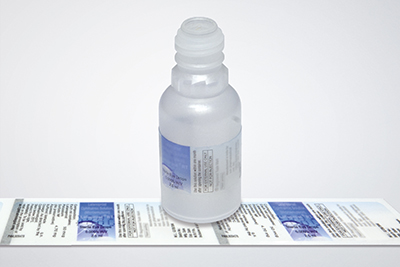Schreiner MediPharm Develops Low Migration Labels
- Published: January 07, 2015, By Claudia Hine
BLAUVELT, NY | Schreiner MediPharm offers low migration labels for use in plastic containers, which are increasingly being used in lieu of glass in primary pharmaceutical packaging. Utilizing qualified adhesive systems, materials, and inks, specialty labels can be customized to suit a wide range of plastic container packaging applications.

A variety of factors—including cost-effectiveness, break resistance, and convenience—explain the rising prominence of plastics in pharmaceutical packaging containers. However, when compared to glass, plastic containers bring an increased risk of package-to-product migration, meaning that molecules from solvents and other substances contained in inks, adhesives, and film materials could potentially migrate through the packaging over time.
This potential drawback is especially relevant in the case of soft plastics; for example, eye drops in soft plastic bottles might be contaminated or their effectiveness impaired. Schreiner MediPharm’s low migration label solutions for plastic containers address this potential downside in a manner that does not compromise the drugs housed therein.
To ensure that harmless materials are used for each particular label design, Schreiner MediPharm conducted a study with a renowned, independent test institute to analyze, calculate, and evaluate the migration tendency of various label compositions. The results make it possible to specifically develop low migration label solutions for each application, without any major expenditure of time or investment by the pharmaceutical manufacturer.
“Schreiner MediPharm’s customized low migration labels can increase the likelihood of a smooth approval process from drug administration authorities, which can lead to a shorter overall time to market,” said Gene Dul, president of Schreiner MediPharm US. “As a growing number of primary packaging containers in the pharmaceutical industry are comprised of plastic, solutions such as these will become increasingly attractive to manufacturers looking to avoid approval slowdowns.”
This email address is being protected from spambots. You need JavaScript enabled to view it.




